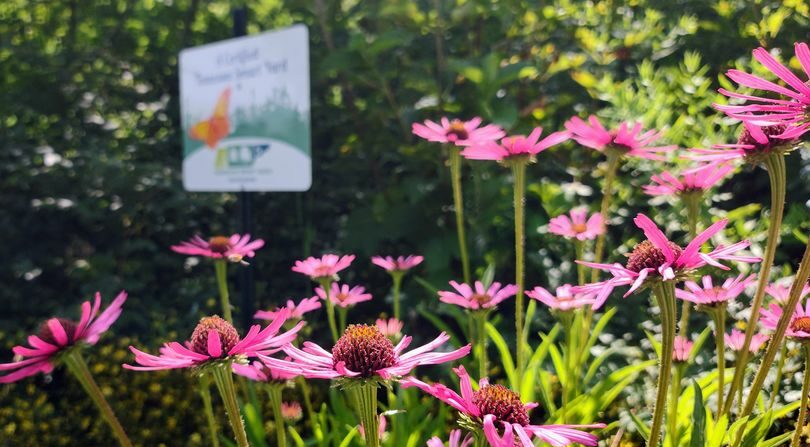Many area residents may not know it, but there are resources available at their fingertips to improve the ecological quality of their own yards and help abate storm-water runoff in the process. And, best of all, the program is free.
Say hello to Tennessee Smart Yards (TNSY), a UT Extension-led program to guide residents in best practices to create more ecologically-sound landscapes. The program promotes nine principles:
- Right plant, right place
- Manage soils and mulch
- Reduce, reuse, recycle water efficiently
- Fertilize appropriately
- Manage yard pests
- Reduce stormwater runoff and pollutants
- Provide for wildlife
- Protect water’s edge
Each principle is supported by a 25 to 40-minute video available on the TNSY website.

Andrea Ludwig Ph.D. and a friend (Photo courtesy of Tennessee Smart Yards)
“Those videos deliver training to help put those principles into practice,” said Andrea Ludwig Ph.D., the program’s director. Ludwig is an associate professor in the department of biosystems engineering and soil science at UT.
“What we give people are keys to care and how to manage a yard in a more natural way with intention,” Ludwig said.
The look of intention is important, she explained, because it isn’t as simple as just tossing some wildflower seeds around the lawn and never mowing. For one thing, that can run someone afoul of both neighbors and local ordinances on yard maintenance.
“Mowing is necessary for turfgrass, but it is best to mow on the highest setting and as little as reasonably possible,” Ludwig said. “Plants are what capture rainwater, and even turf grasses have a role to play in that. The goal is to reduce the amount of water run-off into storm drains.”
Ludwig said that TNSY works with municipalities across the state as well as Knoxville and Knox County with the hope of updating landscape codes to match with the best practice’s TNSY promotes to achieve higher levels of ecological function. She added that where plants are concerned, the focus needs to turn toward a heavier dominance of native plants, shrubs and trees versus non-native ornamentals, especially those that are invasive (privet, English Ivy, Bradford pear trees to name but a few).
“This can be an opportunity for people to educate neighbors who might be questioning these non-traditional yards,” she said. “Native plants support our pollinators, the birds, butterflies and bees. We have to shift the paradigm of what good practices in landscaping are that also protect our water quality.”
In Knox County, Ludwig said participants have the added benefit of having Knox County Master Gardeners available to help answer questions as they’re going through the program.
“They’re doing this as a service project, so it’s great to have that added support,” she said. After completing the program, participants can have their property certified as a Tennessee Smart Yard. Getting a sign is the only cost (but not required).
“Over half the participants go ahead and get the sign. It’s a way to promote this type of yard maintenance,” Ludwig said. “These voluntary actions to improve our environment and reduce our impact have never been more important. There are certainly individual benefits, but also for the greater good of the community.”
Enjoy this introductory video with Dr. Ludwig:
To learn more about Tennessee Smart Yards go here. For a list of invasive plant species to avoid/remove go here.
Beth Kinnane is the community news editor for KnoxTNToday.com.

